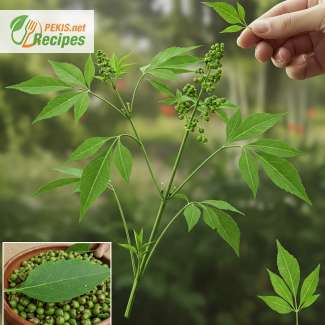
Discovering Epazote: A Unique Herb with Exceptional Benefits
What is Epazote?
Epazote (Dysphania ambrosioides) is a highly aromatic herb native to Central and South America, widely used in Mexican cuisine and traditional medicine. Known for its distinctive pungent scent and slightly bitter, earthy flavor, epazote is often added to bean dishes, soups, and stews. Beyond its culinary applications, the herb has a long history of use in folk medicine, particularly for its potential to aid digestion and alleviate intestinal issues.
Characteristics of Epazote
Epazote is a hardy, fast-growing herb that thrives in warm climates. Its characteristics include:
- Appearance: A tall, leafy plant with serrated edges and elongated green leaves.
- Aroma and Taste: A strong, pungent smell often compared to turpentine, anise, or citrus, with a slightly bitter, medicinal taste.
- Growth Conditions: Prefers full sun and well-drained soil but can tolerate poor soil conditions.
- Lifecycle: It is an annual or short-lived perennial, depending on the climate.
- Seed Production: Produces tiny green flowers that eventually yield small, dark seeds.
Why is Epazote Used?
Epazote has multiple uses in both culinary and medicinal applications, including:
- Culinary Uses: Enhances the flavor of dishes, particularly in Mexican and Latin American cuisines.
- Health Benefits: Used traditionally to support digestion and reduce bloating.
- Pest Repellent: The strong scent deters certain pests in the garden.
- Aromatic Properties: Often used in herbal teas and natural remedies for its scent and purported effects.
How is Epazote Used?
Epazote is a versatile herb that can be used in different forms:
- Fresh Leaves: Chopped and added to soups, stews, and bean dishes.
- Dried Leaves: Used as a seasoning or in herbal teas.
- Essential Oil: Extracted for medicinal and aromatic uses.
- Tinctures and Infusions: Occasionally prepared for traditional medicine.
Health Benefits of Epazote
Epazote is believed to offer several health benefits, including:
- Aiding Digestion: Commonly used to reduce bloating and gas, especially when cooking beans.
- Anti-Parasitic Properties: Traditionally used to help combat intestinal parasites.
- Respiratory Relief: In folk medicine, epazote has been used to ease coughs and congestion.
- Anti-Inflammatory Effects: Some research suggests potential anti-inflammatory properties.
How Does Epazote Work?
The active compounds in epazote contribute to its effects:
- Ascaridole: The primary compound responsible for anti-parasitic and digestive benefits.
- Flavonoids and Terpenes: Provide antioxidant and anti-inflammatory effects.
- Essential Oils: Contribute to its pungent aroma and medicinal properties.
Secrets to Using Epazote
To maximize its benefits:
- Use in Moderation: Its strong flavor can overpower dishes if overused.
- Pair with Beans: Helps neutralize the compounds that cause bloating.
- Avoid Cooking for Too Long: Prolonged heat diminishes its potency and aroma.
Why is Epazote Great for Cooking?
Epazote is a staple in Latin American cuisine due to its ability to:
- Enhance Flavor: Adds a unique taste to soups, tamales, and quesadillas.
- Aid Digestion: Particularly when combined with legumes and heavy foods.
- Improve Aromatics: Infuses dishes with its distinctive scent.
Growing and Harvesting Epazote at Home
- Soil and Light: Prefers full sun and well-drained soil.
- Watering Needs: Requires moderate watering; avoid overwatering.
- Harvesting: Pick young leaves for the best flavor.
- Propagation: Easily grown from seeds or cuttings.
Nutritional Value of Epazote
Epazote contains essential nutrients, including:
- Calories: Low-calorie herb
- Fiber: Supports digestive health
- Vitamin A: Promotes eye health
- Vitamin C: Strengthens immune function
- Calcium and Iron: Essential for bone and blood health
Vitamins and Minerals in Epazote
- Vitamin A - Essential for vision and immunity.
- Vitamin B6 - Supports brain function.
- Vitamin C - Aids in immune defense.
- Folate - Important for cell growth.
- Iron - Prevents anemia.
- Calcium - Supports bone strength.
Additional Insights on Epazote
- Traditional Uses: Used in folk medicine for centuries.
- Caution: High doses can be toxic, particularly the essential oil.
- Companion Planting: Useful in organic gardening to deter pests.
Epazote is an extraordinary herb with a rich history in cooking and traditional medicine. Whether used for its unique flavor, digestive benefits, or medicinal properties, it remains a valuable addition to any kitchen or herb garden. Understanding how to use and grow it can enhance both culinary experiences and well-being.